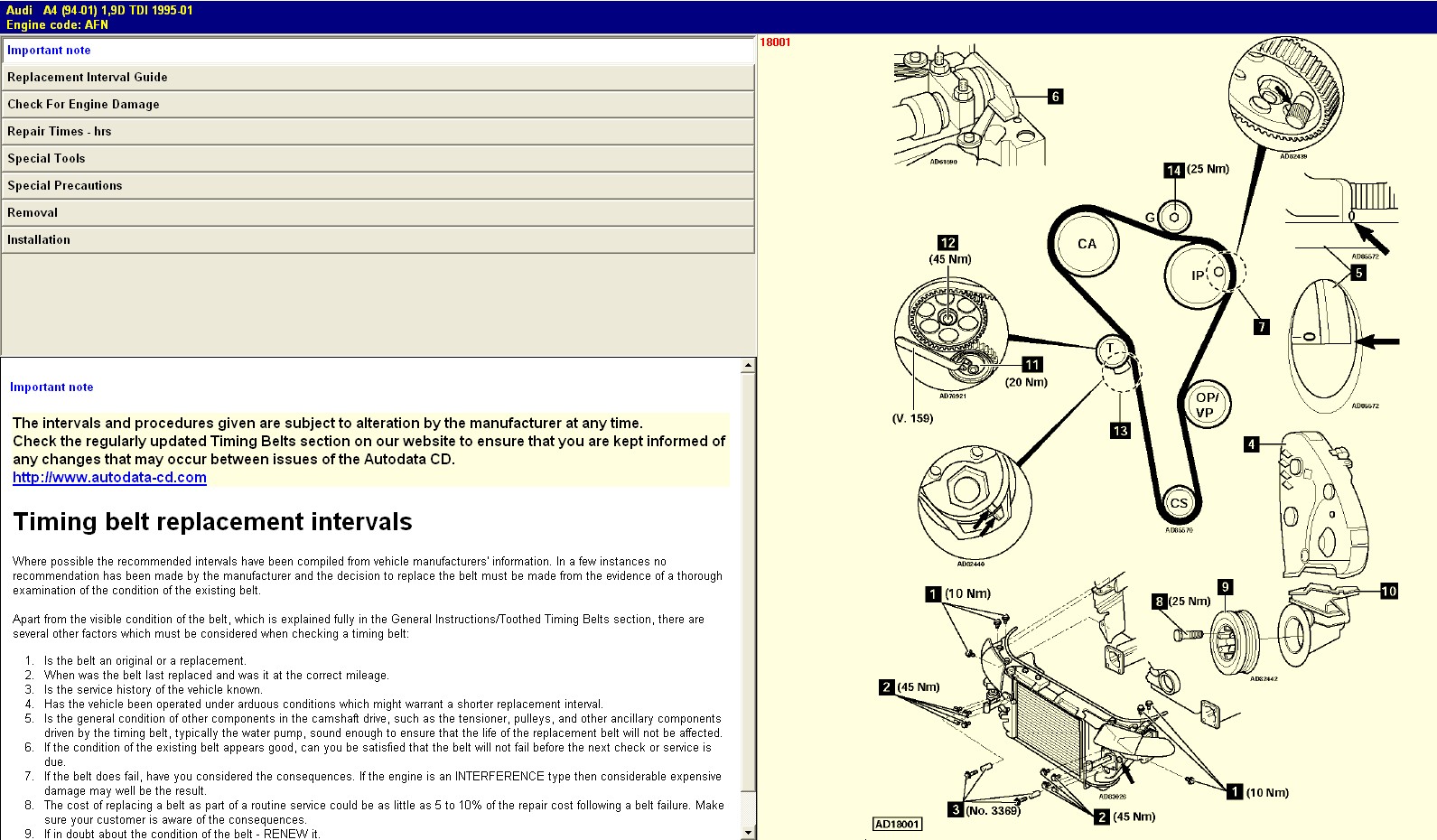A4 1 9tdi (110 koni)

Audi A4 (94-01) 1.9DTDI 1995-01 Engine codę: AFN
Impoitant notę Replacement lnteiv<il Guide Check For Engine Damage Repair Times - his Special Tools Speciai Precautions Removal Instailation
impoitant notę
The intervals and procedures given are subjectto alteration by the manufacturer at any time.
Check the regularly updated Timing Belts section on our website to ensure thatyou are kept informed of
any changes that may occur between issues of the Autodata CD.
Timing belt replacement intervals
Where possible the recommended intervals have been compiled from vehicle manufacturers' information. In a few instances no recommendation has been madę by the manufacturer and the decision to replace the belt must be madę from the evidence of a thorough examination ofthe condition ofthe existing belt.
Apart from the visible condition of the belt, which is explained fully in the General Instructions/Toothed Timing Belts section, there are several other factors which must be considered when checking a timing belt:
1. Is the belt an original or a replacement.
2. When was the belt last replaced and was it at the correct mileage.
3. Is the service history of the vehicle known.
4. Has the vehicle been operated under arduous conditions which might warrant a shorter replacement interwal.
5. Is the generał condition of other components in the camshaft drive, such as the tensioner, pulleys, and other ancillary components driven by the timing belt, typically the water pump, sound enough to ensure that the life of the replacement belt will not be affected.
6. If the condition of the existing belt appears good, can you be satisfied that the belt will not fail before the next check or service is due.
7. If the belt does fail, have you considered the consequences. If the engine is an INTERFERENCE type then considerable expensive damage may well be the result.
3. The cost of replacing a belt as part of a routine service could be as little as 5 to 10% of the repair cost following a belt failure. Make surę your customer is aware of the consequences.
9. If in doubt about the condition of the belt - RENEW it._

Wyszukiwarka
Podobne podstrony:
A4 1 6 (101 koni) Audi A4 (94-01) 1,6 1995-97 Engine codę: ADP Impoitant notę Replacement lnteiv<
A2 1 6 FSI (110 KONI) Audi A2 1,6 FSI 2002-06 Engine codę: BAD Impoitant notę Replacement lnteiv<
A6 1 9 TDI (110 koni) Audi A6 (974)5) 1,9D TDI 1997-02 Engine codę: AFN Impoitant notę Replacement l
S6 4 2 (290 koni) Audi SG 4,2 1994-96 Engine codę: AEC Impoitant notę Replacement lnteiv<il Guide
A6 2 8 (193 koni) APR Audi A6 (97-05) 2,8 1997-02 Engine codę: APR Impoitant notę Replacement lnte
A2 1 4 (75 koni) 18008 Audi A2 1,4 2001-06 Engine codę: BBY Impoitant notę Replacement lnteiv<il
A3 1 9 TDI (90 koni) Audi A3 (97-03) 1,9D TDI 1996-03 Engine codę: AGR Impoitnnt notę Replacement ln
A6 2 4 (136 koni) Audi A6 (974)5) 2,4 1997-05 Engine codę: ALW Impoitant notę Replacement inteiv<
A6 2 4 (136 koni) Audi A6 (974)5) 2,4 19974)5 Engine codę: ALW Impoitant notę Replacement inteiv<
A3 1 8 (125 koni) pasek Audi A3 (97-03) 1,8 19964)3 Engine codę: AGN Impoitant notę Replacement ln
A6 2 8 (193 koni) ALG Audi A6 (97-05) 2,8 1997-02 Engine codę: ALG Impoitont notę Rephicemeut lnte
A6 2 8 (193 koni) APR Audi A6 (97-05) 2,8 1997-02 Engine codę: APR Impoitant notę Rephicement lnte
A4 1 9tdi (110 koni) Audi A4 (94-01) 1,90 1011995-01 Engine codę: AFN Impoitant notę Replacement lnt
Audi? 1 9 tdi (90 koni) Audi 80 (91-96) 1,90 1011991-96 Engine codę: 1Z Impoitant notę Replacement l
więcej podobnych podstron